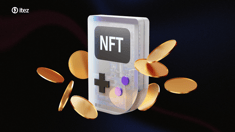On August 17, OpenSea, one of the largest NFT marketplaces, decided to discontinue its onchain tool for forced royalty payments, the Operator Filter. Now, royalties will become optional. This decision has caused mixed reactions within the crypto community. Let's dive into the situation together!
How do OpenSea royalties work
NFT creators have had the option to add a royalty into their collections. This entails a percentage from each subsequent resale of an NFT that later returns to the creator. Such royalties are accomplished through marketplaces like OpenSea, which has been strictly following and promoting the idea of royalties within the crypto space. However, other marketplaces, such as Blur or LooksRare, allow NFTs to be traded royalty-free.
In November 2022, OpenSea added the "Operator Filter" tool, guaranteeing royalties during NFT sales. Being a piece of code integrated into NFT collection smart contracts, this tool also enabled authors to blacklist marketplaces that would allow them to bypass royalties and thus prohibit them from trading their NFTs. But, since August 31, OpenSea has shut down the utility of this tool.
What changed now
According to the marketplace's statement, several factors motivated the developers to stop supporting the "Operator Filter":
1. In order for this tool to work correctly, other marketplaces had to back it as well, but that did not happen.
"The solution requires uniform enforcement by everyone in the ecosystem and is only as effective as its weakest link. Unfortunately, the ecosystem did not adopt the Operator Filter".
2. This kind of an instrument reduced the freedom of authors and collectors.
"The Operator Filter's restrictions come at the expense of decentralised ownership, so with these changes, we are giving collectors more flexibility and choice on creator fees".
3. Royalties are not the only business model for NFT collections, so it is better to develop other opportunities.
"The utility of NFT technology is too diverse for creators to depend solely on a single business model that only monetizes resale".
For existing collections using this tool, royalties will remain mandatory until February 29, 2024, and only then become optional. As for new collections, beginning August 31, royalties will be an optional feature.
Community response
OpenSea's decision was met with mixed reactions. For instance, Yuga Labs, the company behind such well-known collections as BAYC, MAYC, has announced that it is ending its partnership with OpenSea, expressing support for royalties.
Mark Cuban, a prominent billionaire and investor in OpenSea, sees this decision as a mistake detrimental to the entire industry. One user in a response highlighted the problems present in the royalty system, emphasising that royalties are perpetually owed even if NFT is sold at loss.
The founder of the Deadfellaz NFT collection has called for a boycott of OpenSea.
An artist from Reddit NFT Avatars collection believes that while OpenSea's solution may not be the best, the royalty model has its flaws, as it stimulates trading activity and nothing else.
You might also like:








